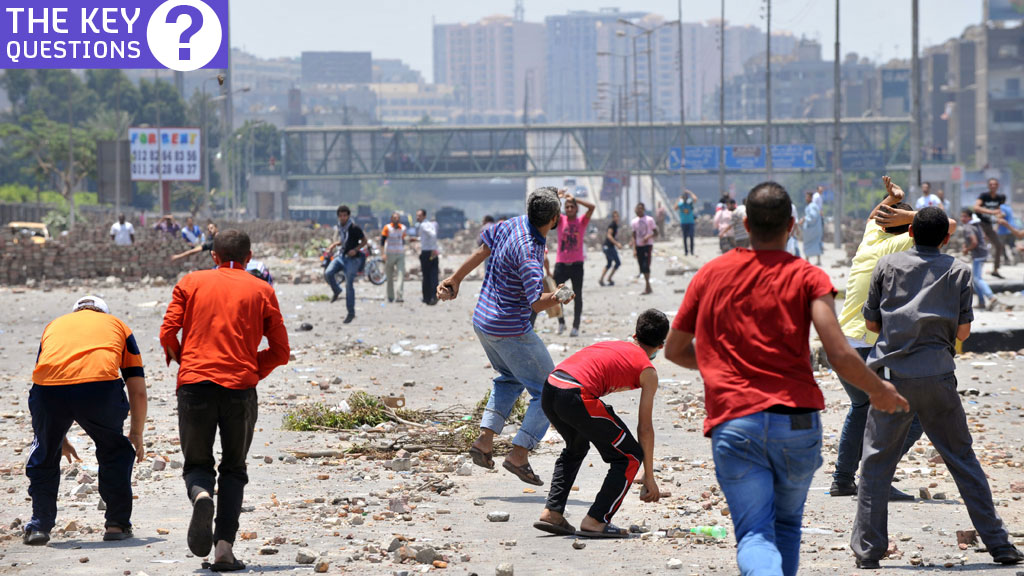What’s happening in Egypt? The key questions
Extreme violence at the weekend in which 83 died, calls for a mass march and now a meeting between the ousted former president and a key EU figure – what is happening in Egypt and what is next?

Baroness Catherine Ashton, who is trying to mediate in Egypt, met former Egyptian President Mohammed Morsi at an undisclosed location and said he was well.
She denied reports that she had offered a “safe exit” to the former president, who has been detained since being toppled by the army on 3 July after days of anti-government protests on the streets of Cairo.
How was Mohammed Morsi toppled?
Mohammed Morsi was freely elected president in June 2012 at the head of a Muslim Brotherhood-led administration.
This followed the Arab Spring uprising against military ruler Hosni Mubarak, who had been in power for almost 30 years when he was deposed in Febuary 2011.
Mr Morsi’s tenure was not a happy one, for himself or for Egypt. He faced constant criticism that he was not doing enough to tackle Egypt’s economic problems and managed to alienate key institutions, while the opposition spoke out against the “reactionary” Islamists at the heart of his government.
The stage was set for big anti-government demonstrations at the end of June, and after refusing to yield to the protesters, the army stepped in and ended his year-long term in office.
It looked and smelt like a coup, but the army said it was just responding to the will of the people and normal democratic service would be restored at a later date.
The US has refused to say whether it believes a coup occurred because it would have implications for the American aid money that Egypt receives.
Former prime minister Tony Blair told Channel 4 News that the army had been right to take action or there would have been “total chaos”.
What has happened to Mohammed Morsi?
Mr Morsi was detained and has not been seen in public since. He is in an undisclosed location and Baroness Ashton is the first outsider to be given access to him.
Afterwards, she said she did not know where she had met him, although many of his backers believe he is being held at the presidential guard headquarters in the capital.
The pair had two hours of talks and Baroness Ashton said he had access to television and knew what had been happening in Egypt.
What action is being taken against Mohammed Morsi?
Mr Morsi is being investigated for alleged murder, related to a 2011 jailbreak when he escaped from detention during protests against Hosni Mubarak.
Inquiries are being carried out into his suspected collaboration with the Palestinian militant group Hamas.
Thousands of Mr Morsi’s supporters set up camp in Cairo after he was ousted and say they will not leave the streets until he is restored to power. They have also staged regular rallies.
How has the Egyptian government responded to protests?
On 8 July, 55 Islamist protesters were shot dead by the army in Cairo.
Afterwards, Egypt’s government ordered the arrest of Muslim Brotherhood spiritual leader Mohammed Badie and nine others for allegedly instigating the violence.
The head of the armed forces, General Abdul Fattah al-Sisi, challenged supporters of the new regime to take to the streets on 26 July.
His call prompted huge crowds to turn out, leading to more bloodshed in Cairo, with 83 protesters killed.
What happens next?
Adly Mansour has been appointed Egypt’s interim leader.
On 9 July, he set out plans for a return to democracy, with the drawing up of a new constitution that would be put to the voters in a referendum, with parliamentary elections following later.
Once the new parliament convenes, it would have a week to set a date for presidential elections. The plan is for elections in early 2014.
Mr Mansour has also called for a national reconciliation conference, but there is little prospect of Mr Morsi being rehabilitated.
Hazem el-Beblawi, the new prime minister, has offered positions in the cabinet to Islamists. including those from the Muslim Brotherhood, but the brotherhood is refusing to negotiate with the government.
It wants Mr Morsi reinstated, jailed brotherhood leaders released and an end to the crackdown on anti-government protests.
Western countries are also calling for Mr Morsi and other Muslim Brotherfood figures to be freed, along with the return of democratic government.
